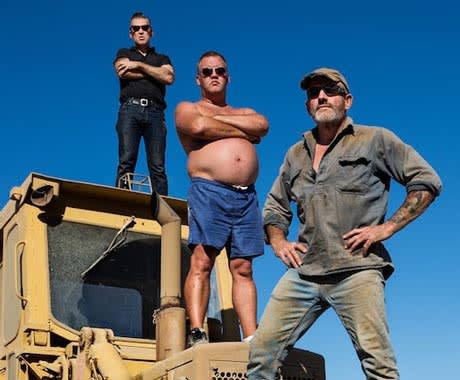The idea of blunt linearity must have been tossed aside early on by director Matt Weston when it came to documenting the life and times of a group described by Buzz Osborne of the Melvins as "always kind of drunk," whose early songs captured the spirit of lead singer Ross Knight's life on a farm with lyrics such as: "I always lived on a farm/ Didn't think it'd be much harm/ Daddy thought I was sick in the head/ Pulled my cock in the hay shed…I love my tractor!"
Drawing on vintage cartoons, live footage spanning over three decades and an extensive list of talking heads, including Butch Vig, Steve Albini, Donita Sparks, Eddie Vedder, Mark Arm, Steve Turner, Sub Pop's Jonathan Poneman, AmRep's Tom Hazelmyer and photographer/S&M enthusiast Whitney Ward (Knight's ex-girlfriend, now married to Joe Coleman), Weston's documentary traces Cosmic Psycho's history back to their early days as a beer guzzling high school band called Spring Plains that later settled on the moniker Cosmic Psychos after being the subject of mockeries by members of Split Enz (as Knight recalls: "That donkey from Split Enz said, 'What a stupid name.' As soon as I heard that story, I thought, 'We'll run with that.' I'm quite happy with it").
Following the group's evolution, stories about Knight's erratic behaviour take the palm early on, as ex-collaborators reminisce about how he preferred to drive his father's new bulldozer around the farm rather than follow the rest of the group on their first European tour (though ex-guitarist Peter Jones argues that Knight thought Europe was too gay for him). Nevertheless, Blokes You Can Trust goes beyond the band's keg parties and depicts the group's high and lows, which range from their accidental but lucrative participation as co-writers of L7's song "Fuel My Fire" (later covered by the Prodigy on their multimillion-selling 1997 album The Fat of the Land) to heavier issues such as estranged relationships between band members and guitarist Robbie Watts' death in 2006.
Weston's editing plays in favour of character building. Filmed during a period when Knight was going through divorce procedures and living in a shed in his backyard, the portrait that emerges is one of a hard working man who grows worried that his farm might be taken away from him by a court settlement. By constantly adding new dimensions to Knight's life, from his relationship with his handicapped son to his career in powerlifting, the phrase "bloke you can trust" ends up being a fitting one for a guy who, during the opening sequences, is akin to a countryside version of Fear's Lee Ving, whose hobbies on tour include games such as "who can go the longest without changing their socks."
In the end, this portrait of the ground holding the weight of everyday life is perhaps the most resonant aspect of Blokes You Can Trust. Not only does one find truth in the perceptive words of the Hard-Ons' Ray Ahn, who argues that Cosmic Psychos are up there in the pantheon of Australian rock'n'rollers with AC/DC, X, Rose Tattoo, the Birthday Party, the Saints and Radio Birdman, but one gets a glimpse at an influential blue collar band for whom acrimony does not equate not making it big.
(MVD)Drawing on vintage cartoons, live footage spanning over three decades and an extensive list of talking heads, including Butch Vig, Steve Albini, Donita Sparks, Eddie Vedder, Mark Arm, Steve Turner, Sub Pop's Jonathan Poneman, AmRep's Tom Hazelmyer and photographer/S&M enthusiast Whitney Ward (Knight's ex-girlfriend, now married to Joe Coleman), Weston's documentary traces Cosmic Psycho's history back to their early days as a beer guzzling high school band called Spring Plains that later settled on the moniker Cosmic Psychos after being the subject of mockeries by members of Split Enz (as Knight recalls: "That donkey from Split Enz said, 'What a stupid name.' As soon as I heard that story, I thought, 'We'll run with that.' I'm quite happy with it").
Following the group's evolution, stories about Knight's erratic behaviour take the palm early on, as ex-collaborators reminisce about how he preferred to drive his father's new bulldozer around the farm rather than follow the rest of the group on their first European tour (though ex-guitarist Peter Jones argues that Knight thought Europe was too gay for him). Nevertheless, Blokes You Can Trust goes beyond the band's keg parties and depicts the group's high and lows, which range from their accidental but lucrative participation as co-writers of L7's song "Fuel My Fire" (later covered by the Prodigy on their multimillion-selling 1997 album The Fat of the Land) to heavier issues such as estranged relationships between band members and guitarist Robbie Watts' death in 2006.
Weston's editing plays in favour of character building. Filmed during a period when Knight was going through divorce procedures and living in a shed in his backyard, the portrait that emerges is one of a hard working man who grows worried that his farm might be taken away from him by a court settlement. By constantly adding new dimensions to Knight's life, from his relationship with his handicapped son to his career in powerlifting, the phrase "bloke you can trust" ends up being a fitting one for a guy who, during the opening sequences, is akin to a countryside version of Fear's Lee Ving, whose hobbies on tour include games such as "who can go the longest without changing their socks."
In the end, this portrait of the ground holding the weight of everyday life is perhaps the most resonant aspect of Blokes You Can Trust. Not only does one find truth in the perceptive words of the Hard-Ons' Ray Ahn, who argues that Cosmic Psychos are up there in the pantheon of Australian rock'n'rollers with AC/DC, X, Rose Tattoo, the Birthday Party, the Saints and Radio Birdman, but one gets a glimpse at an influential blue collar band for whom acrimony does not equate not making it big.
